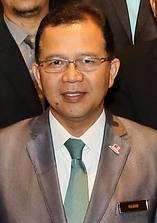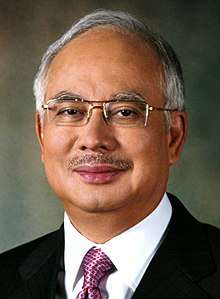Hamim Samuri
Hamim bin Haji Samuri (born 13 June 1958) is a Malaysian politician and was the Member of Parliament of Malaysia for the Ledang constituency in the State of Johor from 2004 to 2018. He is a member of the United Malay National Organisation (UMNO) party in the previously governing Barisan Nasional (BN) coalition.
Yang Berbahagia Datuk Hamim Samuri | |
|---|---|
 | |
| Deputy Minister of Natural Resources and Environment | |
| In office 29 July 2015 – 10 May 2018 | |
| Monarch | Abdul Halim Muhammad V |
| Prime Minister | Najib Razak |
| Minister | Dr. Wan Junaidi Tuanku Jaafar |
| Preceded by | Dr. James Dawos Mamit |
| Succeeded by | Tengku Zulpuri Shah Raja Puji (Natural Resources) Isnaraissah Munirah Majilis (Environment) |
| Constituency | Ledang |
| Deputy Minister of International Trade and Industry | |
| In office 16 May 2013 – 29 July 2015 | |
| Monarch | Abdul Halim |
| Prime Minister | Najib Razak |
| Minister | Mustapa Mohamed |
| Preceded by | Mukhriz Mahathir Jacob Dungau Sagan |
| Succeeded by | Ahmad Maslan |
| Constituency | Ledang |
| Member of the Malaysian Parliament for Ledang | |
| In office 21 March 2004 – 9 May 2018 | |
| Preceded by | Hashim Ismail (UMNO—BN) |
| Succeeded by | Syed Ibrahim Syed Noh (PKR—PH) |
| Majority | 21,671 (2004) 7,617 (2008) 1,967 (2013) |
| Personal details | |
| Born | 13 June 1958 Simpang Renggam, Johor, Federation of Malaya (now Malaysia) |
| Political party | United Malays National Organisation (UMNO) |
| Other political affiliations | Barisan Nasional (BN) Perikatan Nasional (PN) Muafakat Nasional (MN) |
| Alma mater | University of Glasgow Northern University of Malaysia |
| Occupation | Politician |
| Website | hamimledang hamimsamuri |
Political career
Hamim was elected to federal Parliament in the 2004 election.[1] The seat had previously been held by UMNO's Hashim Ismail.[2] He was reelected again in 2008 election and 2013 election but was defeated in 2018 election.
Background
Hamim is married and he has four children.[3] He has a degree in Civil Engineering from the University of Glasgow.[4] In 2013, he obtained his Master in Management from Universiti Utara Malaysia and Doctor of Philosophy (PhD) in Development Management, also from Universiti Utara Malaysia in 2016.[5]
Election results
| Year | Government | Votes | Pct | Opposition | Votes | Pct | Ballots cast | Majority | Turnout | ||
|---|---|---|---|---|---|---|---|---|---|---|---|
| 2004 | Hamim Samuri (UMNO) | 30,967 | 76.91% | Kasim Ibrahim (PAS) | 9,296 | 23.09% | 41,684 | 21,671 | 72.91% | ||
| 2008 | Hamim Samuri (UMNO) | 25,319 | 58.85% | Lau Tek Hai (PKR) | 17,702 | 41.15% | 44,556 | 7,617 | 76.16% | ||
| 2013 | Hamim Samuri (UMNO) | 30,619 | 51.66% | Hassan Abdul Karim (PKR) | 28,652 | 48.34% | 60,382 | 1,967 | 87.11% | ||
| 2018 | Hamim Samuri (UMNO) | 26,040 | 39.80% | Syed Ibrahim Syed Noh (PKR) | 34,706 | 53.06% | 66,708 | 8,666 | 86.10% | ||
| Rusman Kemin (PAS) | 4,668 | 7.14% | |||||||||
Honours

_-_SMN.svg.png)
_-_SMN.svg.png)

See also
References
- "Malaysia Decides 2008". The Star (Malaysia). Retrieved 26 January 2010. Percentage figures are calculated based on total turnout. Includes results from the 2004 election. * denotes incumbent.
- "PAS urged not to divide people with lies, slander". New Straits Times. 15 April 1999. Retrieved 26 January 2010.
- "Biodata – Hamim Samuri". hamimsamuri.com. Archived from the original on 10 February 2018. Retrieved 9 February 2018.
- "Hamim Samuri". Malaysian Representatives Alpha. Sinar Project. Retrieved 31 March 2015.
- "Timbalan Menteri Sumber Asli dan Alam Sekitar". Utusan Malaysia Online. Retrieved 30 October 2017.
- "Keputusan Pilihan Raya Umum Parlimen/Dewan Undangan Negeri" (in Malay). Election Commission of Malaysia. Retrieved 4 February 2017. Percentage figures based on total turnout.
- "Malaysia General Election". undiinfo Malaysian Election Data. Malaysiakini. Retrieved 4 February 2017. Results only available from the 2004 election.
- "KEPUTUSAN PILIHAN RAYA UMUM 13". Sistem Pengurusan Maklumat Pilihan Raya Umum (in Malay). Election Commission of Malaysia. Retrieved 24 March 2017.
- "my undi : Kawasan & Calon-Calon PRU13 : Keputusan PRU13 (Archived copy)". www.myundi.com.my. Archived from the original on 31 March 2014. Retrieved 9 April 2014.
- "Keputusan Pilihan Raya Umum ke-13". Utusan Malaysia. Archived from the original on 21 March 2018. Retrieved 26 October 2014.
- "SEMAKAN KEPUTUSAN PILIHAN RAYA UMUM KE - 14" (in Malay). Election Commission of Malaysia. Retrieved 17 May 2018. Percentage figures based on total turnout.
- "The Star Online GE14". The Star. Retrieved 24 May 2018. Percentage figures based on total turnout.
- "King's birthday honours list". The Star. 3 June 2006. Retrieved 6 October 2018.
- "Hakim dahului 174 penerima pingat daripada Agong". Bernama (in Malay). The Malaysian Times. 26 September 2013. Retrieved 6 October 2018.
